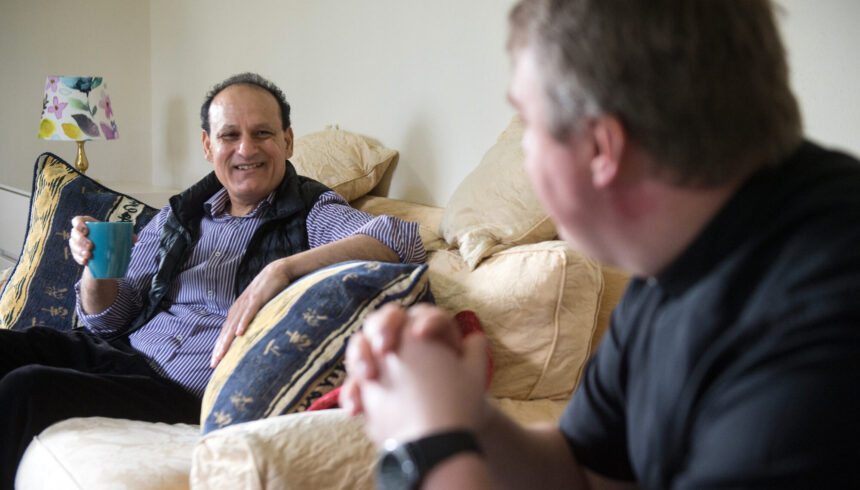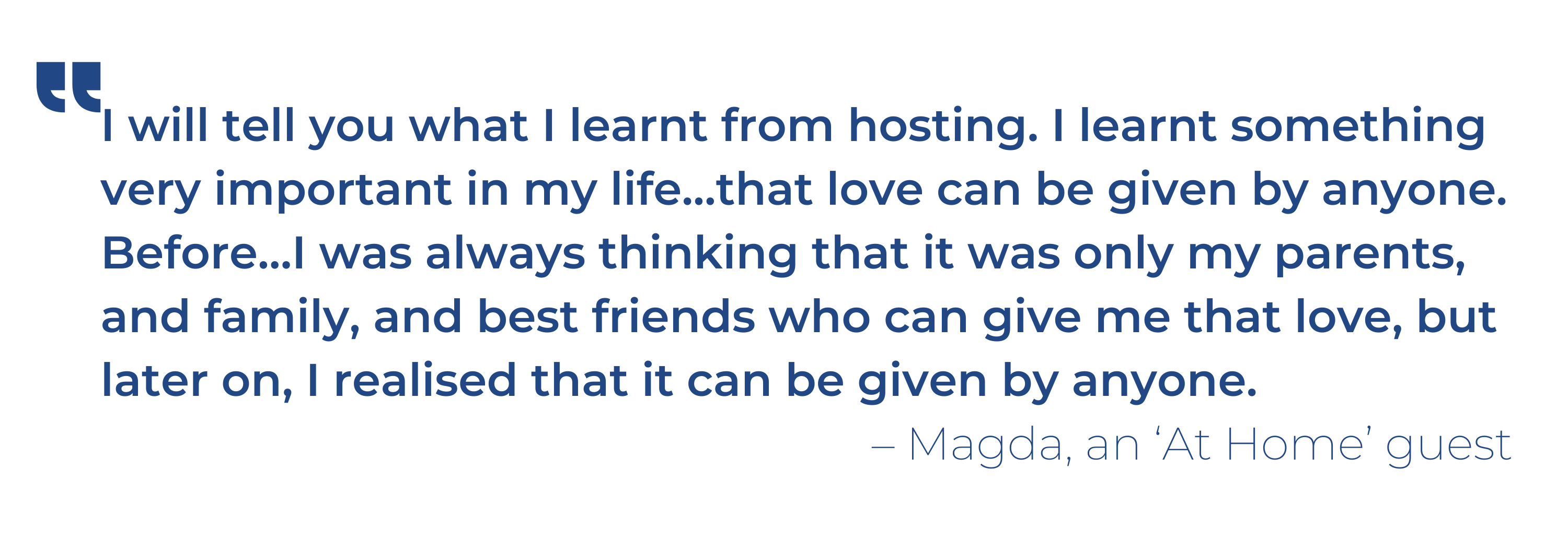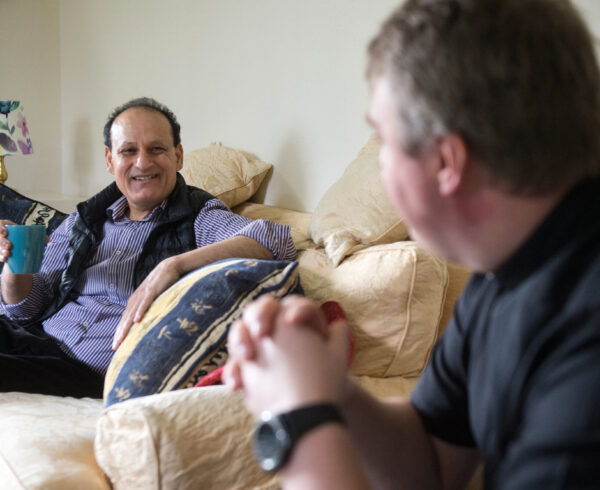At Home
Could you join the JRS UK hosting scheme offering destitute refugees respite accommodation?
Could you host one of our refugee friends?
If you live in the London area and have a spare room, you could make a huge difference to the life of those we support.
One of the greatest challenges faced by the people supported by JRS is the lack of accommodation. Destitute asylum seekers are often forced to seek rest on night buses, rely on friends who might let them ‘sofa surf’ for a night or two, or else find a nook where they can sleep for the night.
These precarious circumstances leave individuals more at risk. Mental and physical wellbeing suffer, relationships can breakdown, and progressing with a legal case becomes increasingly challenging.
In response, the JRS ‘At Home’ scheme aims to match destitute asylum seekers with individuals, families, parishes and religious communities who are able and willing to offer accommodation for an agreed period, which is determined by guest and host need.
We know that opening your home and community to welcome a stranger can be a daunting prospect. For this reason, the ‘At Home’ scheme is designed to prepare hosts and guests in advance of the hosting placement, with support delivered by a dedicated Accommodation Team continuing throughout.


How does it work?

![]](https://www.jrsuk.net/wp-content/themes/jrs/images/quotebracket-right.svg)
Browse our Hosting Handbook
People in need of accommodation and who meet the scheme’s eligibility criteria are identified as potential guests. They are then introduced to hosts who are willing to provide accommodation and a warm welcome for an agreed duration. Guests continue receiving support from JRS throughout the time that they are hosted and can benefit from social inclusion and peer support in our drop-in; financial aid; meaningful activities; legal advice; holistic support; and information, advice, and guidance (IAG).
The JRS Accommodation Officer remains in contact with hosts throughout the placement and you and are encouraged to share your experience and feedback. Meetings which bring hosts together to reflect on their experience are organised throughout the year and give JRS opportunities to learn and grow whilst providing hosts a change to benefit from peer support and insight sharing.
The relationship between the host, be it an individual, family, parish or community, and the guest is at the heart of the hosting placement, and we have seen the change that hosting makes to the host and the guest alike.
For those who have spent nights sleeping rough, having a roof over their heads brings peace of mind and the opportunity to recuperate from the affronts they experience daily.
Receiving hospitality as opposed to hostility elevates and recalls and affirms their humanity and dignity. Equally, hosts often say that, despite their initial apprehension about welcoming a stranger into their space, they find hosting to be a fruitful experience. It enables them to encounter a fellow human being and appreciate that behind the label of ‘asylum seeker’ or ‘destitute and homeless’ is a person with a story, with hopes, dreams and fears, who is seeking to get on with their life, much like the rest of us.
What our hosts say…

![]](https://www.jrsuk.net/wp-content/themes/jrs/images/quotebracket-right.svg)
How did you decide to host with JRS?
“Hosting has been a positive experience for us, and we have had great support from the JRS team from the start…It is an enriching experience for both the hosts and the guests as we learn about each other’s culture. Welcoming someone to the security of a home can be life changing and gives the guest space to build up their strength and confidence.”
What are a few practical things to keep in mind as you host?
“Most guests prefer to cook for themselves and will say what type of food they like. Some will write what they want on the shopping list, hopefully in time for the weekly shopping! Arranging a time for cooking is helpful. Additional bits of food can be bought once the person is in the house. For Muslim guests who adhere to strict observance, a conversation may be useful to ensure consideration for the hosts. Newcomers usually appreciate some information about the local facilities, transport, parks etc. Having a little celebration for their birthday.”
Could you describe how you feel when you know a new guest is on their way to your house?
“My concern is always will they be happy? Will they find a welcome here? How do we make sure they do find a welcome? Also, the communication, if there is difficulty with English how do we communicate? But I usually don’t have any fears because we have had a first meeting and making sure we are both here on the day. It is something about presence: when they arrive at the door, how do we communicate both verbally and non-verbally that this person is welcome in our house? How do get this across? That would be on my mind.
I suppose we invite them to their room, help them with their luggage and bring them down for a cup of tea. Some little ritual to welcome them, but they might just want to settle. They might just want to be alone. Allow them to settle and make them feel the house is theirs. I wouldn’t load them with a pile of rules and regulations on the first day. That induction can wait.
I like to have a flower and a card in the room and that the room will be comfortable. The food would already be in the house. Also leave the Wi-Fi details on the table; they like to get connected pretty quickly. When I open the door, I would see whether they wanted a hug or a handshake. We introduce ourselves and it all comes spontaneously from there. I would get the feeling from the person and then of course take them inside in the sitting room and ask if they wanted any tea or coffee and whether they had had a meal before coming. I would have a little chat with them and see whether they wanted to say something, but we usually would have had a conversation beforehand.”
Do you have any advice for new hosts?
“It’s a learning process – you decide to do it, but then you learn from mistakes. You don’t want to load a new guest with a pile of do’s and don’ts either. Be as natural as possible with them, because their experiences prior to being hosted are usually not very positive. So, you want them to feel at home and natural, and with dignity.”
Ready to get involved?
If would like to host one of our refugee friends, and you live in the Greater London area, you can:
- email us at uk@jrs.net
- give us a call on 020 7488 7310
- Apply now
Outside London?
Contact us for information on other hosting schemes operating in your area or check out these other outstanding providers.






